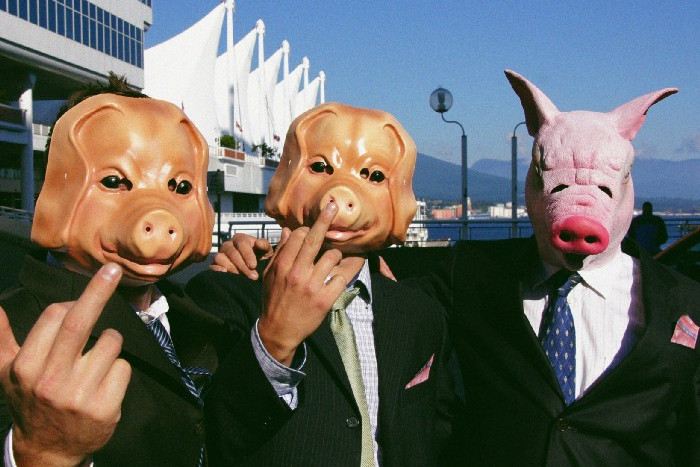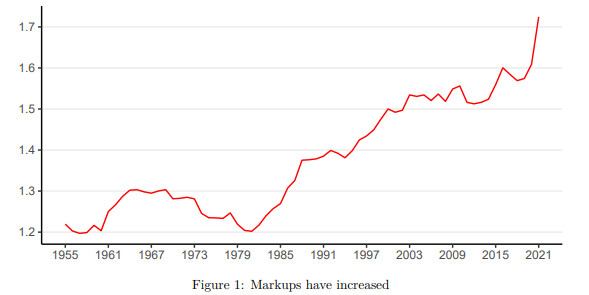
OVERVIEW
MANAGEMENT
PERFORMANCE
POSSIBILITIES
CAPITALS
ACTIVITIES
ACTORS
BURGESS
|
ECONOMY
SOCIO-ECONOMIC DYSFUNCTION Why Everything Will Only Keep Getting More and More Expensive ... The big squeeze is on, and it’s here to stay 
Photo by Horticulture from AdobeStock Original article: https://medium.com/the-no%C3%B6sphere/why-everything-will-only-keep-getting-more-and-more-expensive-8640cd8151f9 Peter Burgess COMMENTARY Peter Burgess | ||
|
Why Everything Will Only Keep Getting More and More Expensive
The big squeeze is on, and it’s here to stay Katie Jgln Aug 25th, 2022 I keep seeing really ridiculous article headlines lately. Here are some of them:
Where I live, in the UK, it seems like we’ve officially entered the ‘people should consider eating mould, going hungry and drinking less water while enjoying the sporadical energy blackouts’ stage of capitalism. And although Britain might be particularly screwed — because of the stupidity of Brexit and blatant incompetence of our corrupt Tory government — the prices of essentials like food, rent, medicine and energy are hitting record highs practically everywhere in the world this year. But the worst thing is that some economists predict that they will never come back to pre-pandemic levels. And we will likely have to put up with higher and higher prices of necessities until one day eating mould or making the most out of a power outage won’t sound as ridiculous as it might today to most of us. Unless something changes, of course. So how did we get ourselves into such a mess? And is there a way out of it?
Inflation is just a convenient excuse
We’re told higher prices are caused by Russia’s war in Ukraine. And supply chain crises. And China’s lockdowns. And a worldwide surge in pent-up demand following the worst of the pandemic. And a shortage of goods and services to meet it. And rising costs of everything from materials to labour. And while it’s true that all of the above have indeed put upward pressure on rent, energy, food prices etc., that’s just not the whole story, is it? Over a year ago, in July 2021, The Wall Street Journal reported that several large consumer goods companies were already starting to test the extent of their pricing power amid rising inflation concerns. In other words, testing how high they can raise prices before customers switch to a cheaper product or brand or stop buying a particular item altogether. But the article also reported that some executives have hinted that such increases would persist past the point of being justified by inflation if customers accepted them. The CEO of one of the largest corporate landlords — Starwood Capital — even said in late 2021 that inflation in consumer prices and wages is ‘an extraordinary gift that keeps on giving’ and added that ‘tenants seem capable and willing to pay these rent increases.’ Right. So while we’ve now accepted higher prices, believing they are perfectly justified because the corporations have higher costs because of the inflation, it turns out that’s not exactly the case. Otherwise, our capitalist overlords wouldn’t be so seemingly delighted with the situation, wouldn’t they? But they are. Because the corporate price hikes often exceed these higher costs. And a recent paper published by the Roosevelt Institute proves just that. Markups — the difference between corporations’ labour and material costs and the price they charge customers — have been rising dramatically over the last year. So dramatically, in fact, that in the US, both corporate markups and profits have reached their highest recorded levels since the 1950s. 
Corporate Markup % from 1955 to 2021 And in the UK, the situation isn’t that much different either. Profit margins for the biggest listed companies were 73% higher in 2021 than pre-pandemic levels in 2019, the latest report by Unite found. So let’s get this straight. For over a year now, giant corporations have not only been testing how far price hikes can go while simultaneously blaming them on inflation and often refusing to give their workers pay raises because ‘it would make the situation worse’, but blatantly getting away with it too. And why is that? Well, simply because they can.
Welcome to the world run by giant corporations
Unprecedented corporate greed that only further fuels inflation — a concept dubbed as ‘greedflation’ — is definitely concerning on its own. However, this situation wouldn’t even be possible if those giant corporations didn’t have the market power to keep squeezing their customers as much as they wanted. But they do. And this is where a large part of this issue lies. Over the last decades, two-thirds of all American industries have become more concentrated. As a result, a small number of large corporations, often with high markups, now dominate many sectors of the economy — from food, tech, entertainment, and manufacturing to oil and gas. But unlike the situation in late 19th-century America, today this isn’t an issue limited to just one country. No, this appears to be a general feature of developed economies — including the European Union and Britain. And because of how interconnected our markets have become, we’re often all being impacted by the decisions the most powerful corporations make.
Let’s take Amazon as an example.
In the last quarter of 2022, their profit nearly doubled. Still, they announced they’ll be increasing the price of its popular Prime membership in the US in February. A few months passed, and they did the same thing in Europe. On average, their annual subscription price has jumped 31%. And not surprisingly, many other global giants have been doing something similar as well — including Unilever, Starbucks, McDonald’s and Netflix. They have the market power to double or even quadruple — as it’s the case when it comes to Big Oil — their profits and the convenient excuse of inflation and rising labour and material costs, so what’s stopping them really? Even in Europe, where the antitrust laws — which control and limit the market power of companies — are fairly strong and definitely much stronger than those in America, this is still the case. So unless we do something, and do it soon, to combat this steady accumulation of profit and market power, prices across the entire global economy are unlikely to come down to pre-pandemic levels. And they will only continue rising and rising. Possibly even forever. We know how to fix things, and yet we don’t You’d think that everyone agrees that people shouldn’t have to eat mouldy food in order to survive. Or take out loans just to be able to buy groceries. Or live in cars because even though they work full-time, they cannot find an affordable place to live. Or have to decide between heating their house this winter or feeding their kids. (And yes, all of the above are real-life situations.) But that’s sadly not the case. Because many people simply… don’t care. I’ve recently watched interviews with UK Conservative Party members who are currently deciding which one of the two poor excuses for a human being — Liz Truss and Rishi Sunak — should become the next Party leader, and that’s essentially what most of them say. Homelessness? Poverty? Starving kids? But why should I care? It’s not my problem. Yup. It’s not their problem. They don’t care because it doesn’t affect them or their wealthy families or friends in any way. And those of them that do care — sort of — believe the solution here is even less regulation and even lower corporate taxes. Because apparently, all those problems aren’t caused by profit-hungry corporations but by immigrants like myself. Or lazy working people. Or god knows what else. It’s really no wonder why we’re in the mess we are in today. Corporate greed and rising market concentration are one side of the story, but people’s general lack of empathy towards others, and lack of care for the well-being of our society and planet, is another. And the sad thing is that economists, policymakers and other experts do have the solutions to the situation we’re in today. We could stop letting corporate greed go unchallenged. We could join our thinking and break up giants dominating our markets. We could combat this tendency toward ever-increasing prices for necessities. And ultimately, we could reshape the underlying political and legal order of our economies that, for now, are largely designed by and for big corporations to maximise their returns at the expense of most people. It all comes down to the right people in power making the right policy choices. And wealth redistribution. And cooperation on a global level. And people finally recognising that homelessness or poverty or other social issues aren’t the sole faults of the individuals, but rather the systems we all live in. But what if we wake up too late? What if most people will continue with all the ‘finger-pointing?’ Or being preoccupied with ‘freedom’ they can’t even define? Or not caring that so many people around them can barely afford to eat and live? One day we might no longer have the option to change things. Because by then, the Jeff Bezoses of this world will already have done everything and anything in their power to prevent the status quo from ever changing. And while we’re going to be here, paying extraordinary amounts of money to barely get by, they’ll fuck right off to some other planet that won’t be burning. ----------------------------------- If you like my work and want to support it, buy me a cup of coffee! For more of my content, subscribe to my Substack newsletter or check out my other social media platforms. Enjoy the read? Reward the writer.Beta Your tip will go to Katie Jgln through a third-party platform of their choice, letting them know you appreciate their story. By The Noösphere ... Making sense of the world one question at a time. Take a look.
| The text being discussed is available at | https://medium.com/the-no%C3%B6sphere/why-everything-will-only-keep-getting-more-and-more-expensive-8640cd8151f9 and |